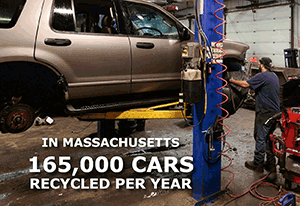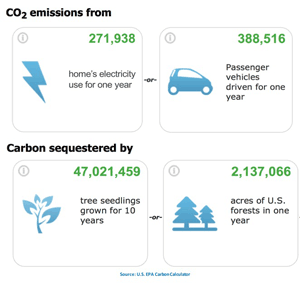Worcester Polytechnic Institute study looks at how auto recyclers affect Massachusetts' carbon footprint
Worcester Polytechnic Institute study looks at how auto recyclers affect Massachusetts' carbon footprint
<
“Our members are focused on recycling every day, but this is the first time we have verified the collective positive impact our industry has on the Massachusetts environment,” says Scott Robertson Jr., a director of ARM and a member of the Executive Committee of the Automotive Recyclers Association (ARA), Manassas, Virginia, which represents the industry globally. “We are fortunate to have the world-class expertise of WPI and the Metal Processing Institute here in Massachusetts to take on this analysis.”
The study, “Assessing the Environmental Impact of Automotive Recyclers of Massachusetts,” was sponsored by ARM and conducted independently by four WPI seniors as their major qualifying project to complete their degrees in mechanical engineering.
“What the automotive recyclers are doing is saving materials, saving energy and impacting the environment in a positive way, thus adding value to the economy of the state,” says Professor Brajendra Mishra, Ph.D., director of the Metal Processing Institute at WPI and advisor for the study.
Through site visits and a survey of ARM member companies, the WPI team examined operations at auto recycling facilities across Massachusetts and documented their processes for reclaiming auto parts, recycling metals and capturing fluids such oil, gasoline and antifreeze to process properly.
The study found an estimated 165,000 vehicles are recycled by ARM members in a typical year. The team calculated the energy saved by reusing auto parts from those vehicles, like engines and transmissions versus manufacturing new parts. They also calculated the energy saved by recycling the steel and aluminum left in the vehicles rather than mining ores and refining new metals. That analysis showed 2.2 million tons of the leading greenhouse gas, carbon dioxide (CO2), was saved by reducing the need to refine new materials and manufacture new auto parts.

By putting metals and useable parts back into the automotive supply chain, ARM companies help drive a circular economy in auto manufacturing, Mishra says. “We make a car. We use a car, and we completely recycle the car so the materials stay in the system, in a circle, and we want to do that for as long as we can.”
Fostering a circular economy across many industries is vital for the long-term sustainability of our society, Mishra adds. “The total primary resource available on the Earth is going down. The quality of these resources is going down. Whereas, with the increase in population, the demand for materials is increasing, so we have no other choice but to recycle these materials and put them back into the system,” he says.
The full study and a video interview with Mishra are available at http://bit.ly/2xzEjwf.
]]>
Source: Recycling Today
Worcester Polytechnic Institute study looks at how auto recyclers affect Massachusetts' carbon footprint
<
